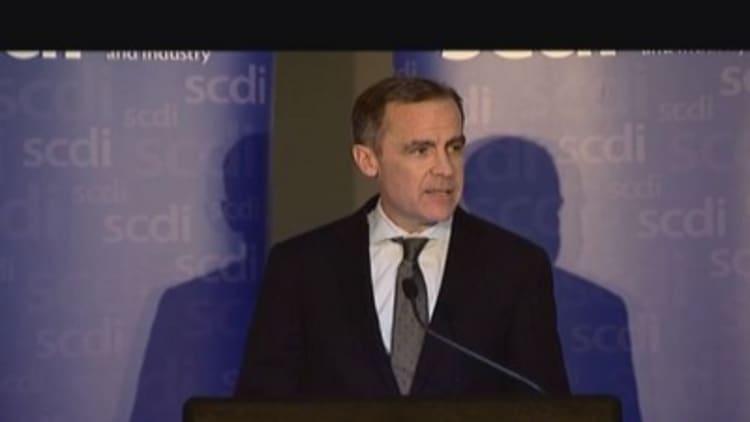Scotland's First Minister Alex Salmond has defied critics of his plans for a post-independence currency union with the rest of the UK, insisting such a pact would leave Edinburgh in full control of taxation.
In an interview with the Financial Times, Mr Salmond waved aside concerns about the working of such a currency union, which were highlighted this week by an unprecedented intervention in Scotland's independence debate by Mark Carney, governor of the Bank of England.
The first minister also reiterated his warning that an independent Scotland could walk away from its share of the UK's £1.2 trillion national debt if Westminster continued to reject its plans to share the Bank of England.
(Read more: Carney to Scotland: Be careful what you wish for)
The currency question is one of the central battlefields in campaigning ahead of Scotland's referendum in September on whether to leave the UK, a vote that would have far reaching consequences across the British Isles and beyond.
Pro-union campaigners have seized on Mr Carney's suggestion that a post-independence currency union would require "very significant" pooling of fiscal resources between an independent Scotland and the remaining UK.
Alistair Darling, former UK chancellor and leader of the pro-union Better Together campaign, claims a currency deal would mean Scotland would have to seek approval from London for its tax policy.
More from the Financial Times:
Alex Salmond on . . .
Salmond on his critics, cricket and independence
Lloyds and RBS: too big for an independent Scotland
Mr Salmond said an independent Scotland would be happy to cede sovereignty on monetary policy but on fiscal policy it would only have to accept aggregate limits to state debt and borrowing.
"That doesn't cover the rates of taxation, I don't think there's any need for that," the first minister said.
(Read more: Scotland independence: Widnae it work?)

Analysts say the currency issue is a vulnerability for the independence campaign, while some nationalists outside Mr Salmond's Scottish National party are vocally worried about the limits that keeping the pound would mean for fiscal policy. At any rate, UK ministers say London would be unwilling to agree to such a pact.
Mr Salmond's case for currency union is based on proposals laid out by a committee of economists that includes Nobel laureate Sir Jim Mirrlees – cited by Mr Carney in his Edinburgh speech as a former academic supervisor and a "great influence on the profession".
But Mr Carney's talk of the possible need for fiscal pooling contrasts with the conclusions of Prof Jim Mirrlees and his colleagues, who argue a currency union would require only a joint "sustainability agreement' between London and Edinburgh.
Some in the SNP accept that currency union might involve much greater limits to fiscal policy freedom, but say it would still leave an independent Scotland with far more control over its economic destiny than possible as a devolved part of the UK.
(Read more: UK to make debt pledge ahead of Scotland referendum)
In the interview, Mr Salmond refused to consider a "Plan B" on the currency, warning that refusal by the remaining UK to accept shared use of the Bank of England would free Scotland of any responsibility for the UK debt.
"You've got a negotiation where the UK government will want to persuade the Scottish representatives that they should take on a share of debt which is the legal liability of Her Majesty's Treasury," he said.

